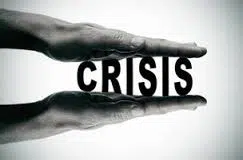
Your first impulse may be to ignore that email — or maybe run away, or get cranky, or at least hold off on saying anything at all until you have everything perfectly sorted out. Unfortunately, that will only make your new nightmare worse.
Every business experiences crises. Handling them calmly, confidently, and with integrity will help you weather the storm, and may even help you gain customers or clients by showing how reliable you are in the face of catastrophe. Here are some guidelines to keep in mind:
1. Never say “No comment.” It might seem that the safest way to avoid saying the wrong thing would be to avoid saying anything at all, but in fact silence speaks volumes. Stonewalling the media tends to make you look shifty or underinformed.
If you really can’t say anything on a subject, being honest goes a long way: “We’re doing our best to find that out,” or “I don’t have that information, but let me get back to you as soon as I can tell you more.”

It’s a journalist’s job to ask you uncomfortable questions, and maybe even to get you off-guard enough to spill more details than you intend. Keep your head and be honest, showing the reporters — and their readers, viewers, and listeners — that you’re perfectly capable of handling the situation as well as their questions.
3. Take responsibility. This may not have been entirely your fault, but pointing fingers doesn’t make anybody look good. Own up to whatever you or your company did, and thoroughly explain why it happened. And, of course, talk about the steps you’re taking to fix the problem and to make sure it never happens again.
4. Correct false information. Rumors, misconceptions, and half-truths sometimes end up reported as facts in the first moments of a crisis. This is your chance to set the record straight. Most journalists really do want to get at the truth, and the sooner you calmly explain the details they need to tell the story accurately, the less you’ll have to deal with corrections and misinformation swirling around.
5. Stay on the record. If seeing some detail in print will come back to haunt you, avoid sharing that detail with journalists, period. Especially avoid going back and forth between on-the-record and off-the-record comments, which usually results in a tangle of misunderstandings about how much of what you said should be published.
6. Show compassion. You’re human, and something you did (or didn’t do) has ended up hurting other humans. You don’t want to come across as guilty or cold: Show that you understand and empathize with the people who were affected, and you’ll demonstrate that you’re genuine about wanting to make the situation right.
Every ship on the sea has to weather some tough storms. When piloting through them, often a captain’s best course to avoid tipping over is to steer straight into the waves. The media storm is no different: Calmly face the crisis head-on, and you’ll survive to sail another day. For more information on Crisis Communication, click here.
